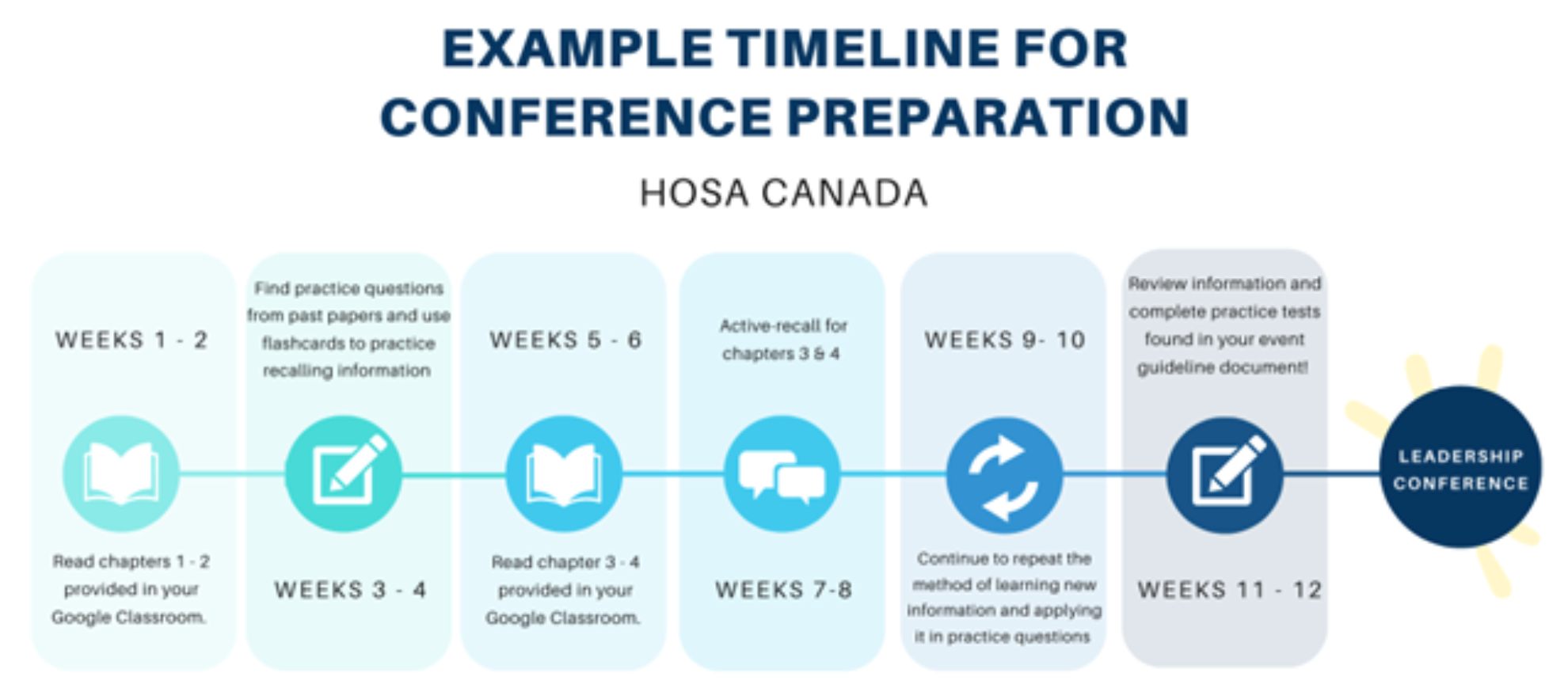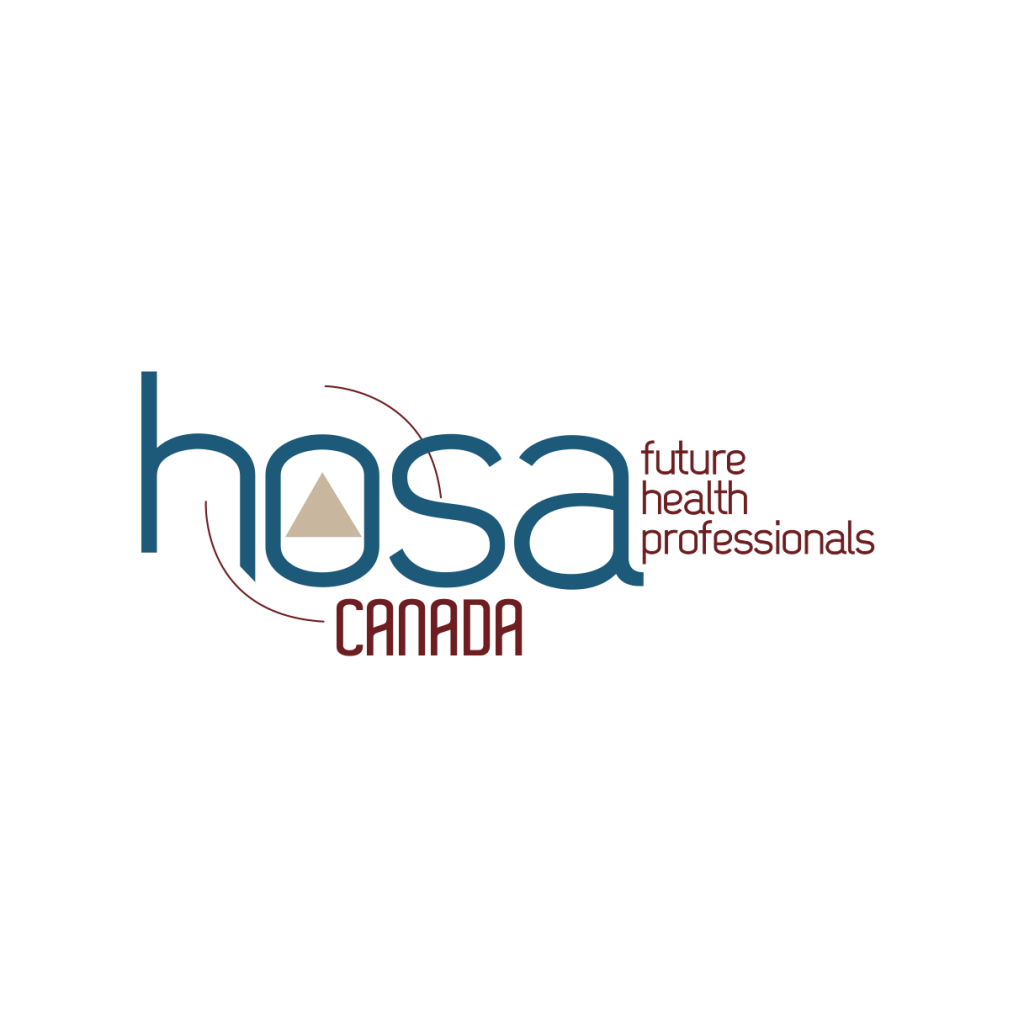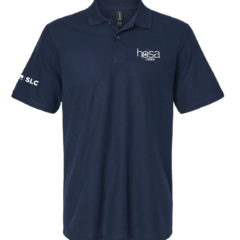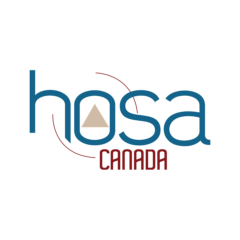Study Resources
Immediately after students pay their registration fee on the registration website, students will receive access to study resources for all competitive events. These resources include slideshows with the content that we have been informed you will be tested on. They also include practice quizzes, skill videos, and most important your event guidelines that inform you how your event will run at the conferences.
How to Access the Resources: Click here or you can log in at hosa-member.ca/login. Then, right-click on “Courses” in the left menu and click on your event.
Study Tips/Techniques
There are a variety of techniques and methods students can use to prepare for their event at HOSA Canada. Here are a few engaging and effective ways to study before FLC and SLC!
Study Resources: Here at HOSA Canada, we have created study resources for all of the competitive events we offer. We have a variety of slide decks and practice tests covering the material that you will be tested on in the competition. Reading and thoroughly understanding the information and visuals provided to you ensures that you are prepared for our conferences.
Workshops: With your registration fee, you get access to all of HOSA Canada’s workshops all year round. We offer competitive event specific workshops that allow you to learn how to effectively study and prepare for the competitive event you have registered for. Some of these workshops have prior ILC winners to provide you with tips and tricks to succeed in our competitions. To learn more about our workshops, visit this website.
Practice (!!): In our event guidelines and study resources, there are practice questions available for each event that has a written test. These practice questions are made to ensure that competitors have a sense of what the questions are going to be like prior to the competition. They are a great way to practice and test your knowledge.
For skill events (ex. CPR/AED First Aid) practicing all the skills indicated in your event guidelines is an essential part of your preparation. Skill videos have been included in your study material, however simply searching the skill on YouTube will provide you with additional supplemental material. If your event has teammates, make sure you are practicing the skills as a team, so that you can help each other learn, and provide feedback.
For events with a presentation, ensure that you do mock presentations prior to the conference. The less you use your script and presentation aids, the more your judges will feel that you’re prepared. One important component of mock presentations is to present in front of your peers, and ask them for feedback on how you can improve. Your event guidelines contain important information for your presentation, ex. presentation duration, material required, laptop aids, etc, ensure that you are aware of all these rules, to risk losing points or being disqualified.
Flashcards: Apart from simply reading the material provided to you, creating notes and flashcards can be a great way to absorb information. Making flashcards can not only help you study on the go and memorize tough concepts quickly but can also help with understanding diagrams and visuals. A great tool for creating and finding flashcard sets is quizlet.com. There are many already-existing, free Quizlets available online for some of the competitive events.
Judges Rating Sheet: Before studying it is important to familiarize yourself with the judge’s Rating Sheet. This sheet can be found in your event guideline document in the format of a rubric at https://hosacanada.org/home/2024-2025-event-guidelines/. These sheets have been created so competitors know exactly what they are being judged on.
Example Timeline for Conference Preparation
It is best to start your conference preparation 3 – 6 months before your conference. Starting with the provided study resources to other external resources such as Quizlet, spacing out your study sessions is the key to success. Here is an example of how you might want to split your study sessions.

Knowledge Written Events
| WEEK | PREPARATION |
| 1-2 | Read chapters 1 and 2 provided in your Google Classroom. |
| 3-4 | Go back and find practice questions from past papers and use Quizlet sets to practice recalling the new information learned. |
| 5-6 | Read chapters 3 – 4 provided in your Google Classroom. |
| 7-8 | Active-recall for chapters 3 & 4
Below are some examples of how you can practice active-recall.
|
| 9-10 | Continue to repeat the method of learning new information and applying it in practice questions to strengthen information retention.
If you have an essay or presentation component make sure to practice completing them within the time limit of your event. |
| 11-12 | Use the last few weeks before the competition to review the different concepts learned. Put your knowledge to the test by completing a few practice tests that are often found in your event guideline document! |
Teamwork Events
| WEEK | PREPARATION |
| 1-2 | Individually read chapters 1 – 2 found in your Google Classroom |
| 3-4 | Go back and find practice questions – test each other on the material you have studied |
| 5-6 | Read chapters 3 – 4 provided in your Google Classroom |
| 7-8 | Active recall for chapters 1 – 4
Below are some examples of how you can practice active-recall.
|
| 9-10 | Practice as a team by compiling all of your knowledge |
| 11-12 | Review any outstanding concepts, do many practice questions, and try to always practice as a team |
Note: the ideal way to prepare for your conference varies heavily on the event. For instance, knowledge-heavy events like Medical Terminology and Medical Math require you to repeat certain concepts or topics. This time frame is only a general suggestion for competitors—after all, everyone learns at their own speed and it is essential to pace yourself!
Chapter-Led Group Study Ideas
Group study sessions are a fun and effective way to prepare for our Fall and Spring Leadership Conferences. Creating engaging and fun activities during chapter-led group study sessions will increase confidence and support.
Group Trivia/Jeopardy: Creating a group trivia or maybe even a Jeopardy game will help students work together and compile their HOSA Canada knowledge to study with others. These activities will help with information retention and will help to increase collaboration within your chapter. One of the ways to do this can be through using Kahoot!
Whiteboard Teaching: Begin by writing the big idea on a whiteboard or even a piece of paper. Then proceed to teach the concept to your friend/group. This way you will identify areas where you are not as confident. Your peers may also provide suggestions on how to remember or understand a difficult concept since everyone has different methods of studying.
Guest Lecturers from the Community: Reaching out to health professionals, professors, and teachers at your own school is a great way to learn from members of your community. Many times they have practical experience in healthcare and have a vast amount of knowledge that can apply to many HOSA Canada events. Reach out and kindly ask them to be guest lecturers at your HOSA Canada Chapter!
Mock Conferences: One of the most effective ways to study for HOSA Canada is by hosting a mock conference. You can host it within your school or collaborate with other schools as well. Find practice questions, ask teachers to act as judges, and provide feedback to competitors to help them learn and immerse in the HOSA Canada Experience. A mock conference helps to prepare students and know what to expect in time for our leadership conferences!
These are just a few ideas on how you can study your chapter. At the end of the day, it is important to come up with unique ways of learning that fit your style and needs.


